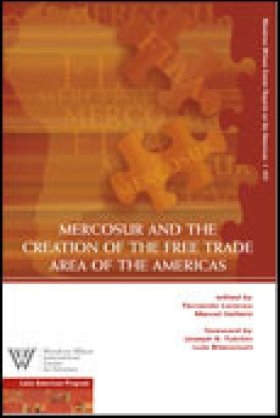Mercosur and the Creation of the Free Trade Area of the Americas


Click the .pdf link to download the book (3 megabytes).
Edited by Fernando Lorenzo and Marcel Vaillant
Foreward by Joseph S. Tulchin and Luis Bitencourt
Excerpted from the Preface
This book results from a convergence of initiatives conducted by two institutions concerned with the prospects for regional trade integration in the Western Hemisphere: the Latin American Program of the Woodrow Wilson International Center for Scholars (LAP/WWIC) and Red de Investigaciones Económicas del Mercosur (Red-Mercosur).
The Wilson Center has been paying close attention to the steps toward regional trade and integration following the launch of the Free Trade Area of the Americas (FTAA) initiative in 1994. Since then, the Latin American Program and, since 2000, its project Brazil @ The Wilson Center have hosted a number of seminars on regional integration and the Mercosur, the role of Latin America within the international system, and Brazilian and Argentine approaches to international trade. We have also published three books on the subject: Latin America in the New International System (2000), Paths to Regional Integration: The Case of Mercosur (2002) and The Strategic Dynamics of Latin American Trade (2004).
With financial support from the Tinker Foundation and the GE Foundation, this joint project included the organization of a seminar and the publication of this book summarizing the status of negotiations aimed at the creation of an FTAA, with special attention to the positions of Mercosur countries.
The seminar took place on 26 February 2004, in Washington, DC, and gathered, in addition to the sixteen chapter authors, trade negotiators and diplomats who brought distinct and often differing perspectives on the complex nature of the ongoing negotiations. During a panel that contrasted official positions toward the FTAA, Rubens Barbosa, Brazilian Ambassador to the United States, Alejandro Casiró, a senior diplomat from the Argentine Embassy, and Karen Lezny, a senior negotiator from the office of the U.S. Trade Representative, agreed that success will depend on a level of mutual commitments and concessions currently not present in the negotiations. Their lively debate unveiled some variables of the complex, dynamic, and asymmetric nature of the process. Qualifying Mercosur as a strategic alliance, both Barbosa and Casiró affirmed that the feasibility of the FTAA depends largely on the elimination of agricultural subsidies and antidumping policies practiced by the United States. Barbosa also criticized the United States for having altered its multilateral approach—required by the very nature of the FTAA commitment—to a bilateral-agreement approach, as a tactic to neutralize the unity of the Mercosur. He conceded, however, that the Brazilian approach to the FTAA negotiations changed between the Cardoso and Lula administrations: whereas Cardoso's team was more flexible during the intermediary steps of the negotiation, postponing major disagreements to the end, Lula's team negotiates zealously at every step.
Conversely, Lezny made clear that for the United States progress in the FTAA was linked to the disposition of the Mercosur countries to negotiate on government procurement, services, and intellectual property. In what illustrates the intertwined nature of regional and global stances, she added that the United States would consider discussing agricultural subsidies only after concluding negotiations with the European Union and Japan in the context of the World Trade Organization.
The seminar provided nuances to these different positions often tainted by political and emotional discourses. The rationale for U.S. interest in promoting an FTAA draws on the perception that the mature U.S. economy has few opportunities to grow domestically and must open foreign markets for its products. However, while U.S. negotiators envisaged the FTAA as merely an extension of the North American Free Trade Area (NAFTA), Mercosur negotiators had a different idea. The United States believes that, in addition to the elimination of tariffs and quotas on trade, the FTAA should include a hemisphere-wide code on matters such as copyright and patent protection, foreign investors' property rights, and rules for government procurement. It would not include, though, the issue of agricultural subsidies. For the Mercosur countries, the FTAA rests upon a reduction of U.S. agricultural subsidies and Mercosur in itself is transformed into a strategic platform.
The ten chapters of this book shed light on the debate on these negotiations. Focusing on political as well as technical issues, these chapters encompass a broad range of themes critical to the implementation of the FTAA.

Brazil Institute
The Brazil Institute—the only country-specific policy institution focused on Brazil in Washington—aims to deepen understanding of Brazil’s complex landscape and strengthen relations between Brazilian and US institutions across all sectors. Read more




